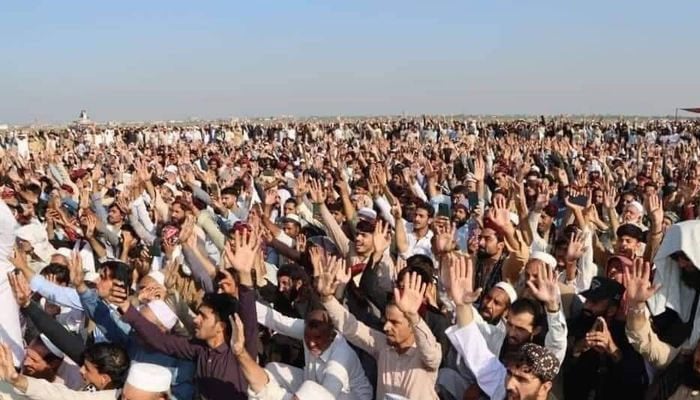Pashtun Qaumi Jirga begins amid high hopes
Manzoor Pashteen calls for peace and rule of law in Khyber Pakhtunkhwa, stressing importance of non-violence
PESHAWAR: The Pashtun Qaumi Jirga formally began on Saturday with high hopes a solution could be found to the issues of peace, security and justice in the region ravaged by conflict for years.
Organised by Pashtun Tahaffuz Movement (PTM), the Jirga, which began on Saturday, saw its first day dedicated primarily to arrangements of facilities for attendees instead of any speech or other activities.
On the second day, notable political figures from various political parties attended the Jirga. They included Aimal Wali Khan, Mian Iftikhar Hussain and Hussain Shah Yusufzai of Awami National Party (ANP), Mushtaq Ahmad Khan of Jamaat-e-Islami (JI), Sohail Afridi and Iqbal Afridi and other MPAs and MNAs from Pakistan Tehreek-e-Insaf (PTI). The organisers said representatives of 20 political parties were attending the Jirga.
The key address of the day came from PTM leader Manzoor Pashteen. He called for peace and rule of law in Khyber Pakhtunkhwa, stressing the importance of non-violence. “War has failed to provide any solutions in the past. We only demand peace, justice and law and order in Khyber Pakhtunkhwa like other provinces of the country,” he remarked.
Pashteen’s speech avoided any direct criticism of state institutions, focusing instead on long-standing grievances, including unresolved issue of missing persons, many of whom have been unaccounted for over years of unrest. He renewed the call for their immediate release, underlining the suffering of families in the region.
A two-hour documentary was screened that highlighted the devastating impact of violence and displacement in Khyber Pakhtunkhwa. According to the documentary, 76,584 people from Khyber Pakhtunkhwa have been killed in bombings, shootings and other attacks over the years, while an estimated 6,700 people remain missing. This documentary and other videos of the people who are victims of the war was broadcast live on 43 screens across 13 countries, ensuring global Pashtun diaspora stayed connected to the Jirga.
The provincial government, in an effort to support the Jirga, organised a free medical camp and provided basic amenities such as ambulances, tents and drinking water. Despite these efforts, several participants voiced dissatisfaction with the arrangements.
Many complained about inadequate food, shelter and water. A resident from Waziristan expressed disappointment, saying, “We came expecting speeches from senior tribal leaders and politicians to address our concerns, but apart from Manzoor Pashteen’s speech, there has been little meaningful dialogue”.
Another participant from Bajaur echoed these sentiments, observing some politicians appeared to have attended the Jirga more for photo opportunities rather than for engaging with the attendees. “They came, took selfies and videos and left without addressing the crowd,” he remarked.
The second day’s proceedings reflect both hope and frustration of the Pashtun people. While the gathering has brought together key political and civil society figures, many attendees feel tangible progress on pressing issues, particularly the plight of missing persons and victims of conflict, is still lacking. The Jirga will conclude on October 13.
-
 Prince Harry Warns Meghan Markle To 'step Back'
Prince Harry Warns Meghan Markle To 'step Back' -
 Selena Gomez Explains Why She Thought Lupus Was 'life-or-death'
Selena Gomez Explains Why She Thought Lupus Was 'life-or-death' -
 New Zealand Flood Crisis: State Of Emergency Declared As North Island Braces For More Storms
New Zealand Flood Crisis: State Of Emergency Declared As North Island Braces For More Storms -
 Nancy Guthrie Case: Mystery Deepens As Unknown DNA Found At Property
Nancy Guthrie Case: Mystery Deepens As Unknown DNA Found At Property -
 James Van Der Beek's Brother Breaks Silence On Actor's Tragic Death
James Van Der Beek's Brother Breaks Silence On Actor's Tragic Death -
 Megan Thee Stallion On New Romance With Klay Thompson: 'I'm Comfy'
Megan Thee Stallion On New Romance With Klay Thompson: 'I'm Comfy' -
 Nicole Kidman Celebrates Galentine’s Day Months After Keith Urban Split
Nicole Kidman Celebrates Galentine’s Day Months After Keith Urban Split -
 Justin Bieber Unveils Hailey Bieber As First Face Of SKYLRK In Intimate Campaign Debut
Justin Bieber Unveils Hailey Bieber As First Face Of SKYLRK In Intimate Campaign Debut -
 Caitlin O’Connor Says Fiance Joe Manganiello Has Changed Valentine’s Day For Her
Caitlin O’Connor Says Fiance Joe Manganiello Has Changed Valentine’s Day For Her -
 Rachel Zoe Sends Out Message For Womne With Her Post-divorce Diamond Ring
Rachel Zoe Sends Out Message For Womne With Her Post-divorce Diamond Ring -
 James Van Der Beek's Final Conversation With Director Roger Avary Laid Bare: 'We Cried'
James Van Der Beek's Final Conversation With Director Roger Avary Laid Bare: 'We Cried' -
 Jaden Smith Walks Out Of Interview After Kanye West Question At Film Premiere
Jaden Smith Walks Out Of Interview After Kanye West Question At Film Premiere -
 Michelle Obama Gets Candid About Spontaneous Decision At Piercings Tattoo
Michelle Obama Gets Candid About Spontaneous Decision At Piercings Tattoo -
 Why Halle Berry Wasn't Ready For Marriage After Van Hunt Popped Question? Source
Why Halle Berry Wasn't Ready For Marriage After Van Hunt Popped Question? Source -
 Bunnie Xo Shares Raw Confession After Year-long IVF Struggle
Bunnie Xo Shares Raw Confession After Year-long IVF Struggle -
 Brooks Nader Reveals Why She Quit Fillers After Years
Brooks Nader Reveals Why She Quit Fillers After Years




